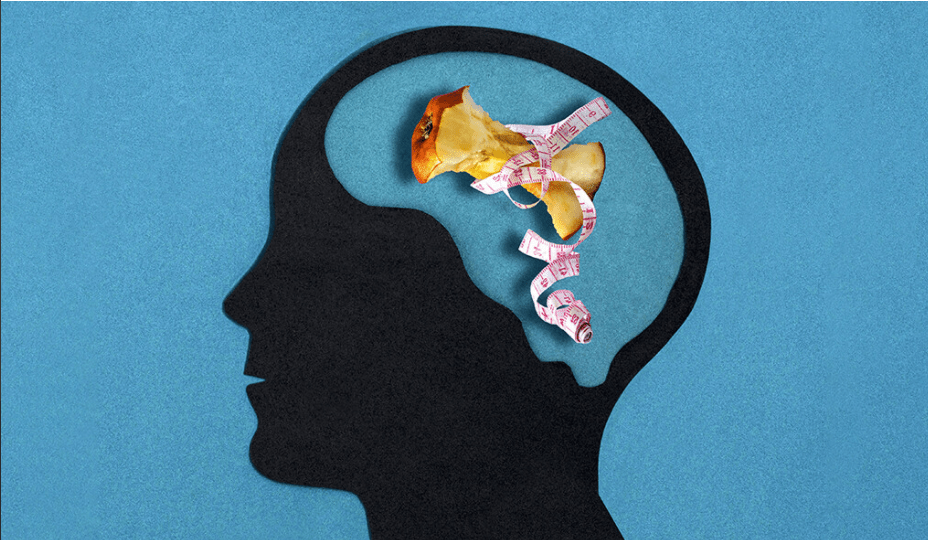Eating disorders are serious mental illnesses that can have devastating consequences if left untreated. Unfortunately, many people with eating disorders go undiagnosed for a long time because they are ashamed of their behavior and don’t want anyone to know about it. In this blog post, we will discuss 11 signs that you or someone you know may be struggling with an eating disorder. If you recognize any of these signs, please seek professional help right away!
Contents
- 1 Defining Eating Disorders
- 2 11 Most Common Eating Disorder Behaviors
- 2.1 Skipping meals or eating very small portions
- 2.2 Eating only certain “safe” foods and avoiding others
- 2.3 Excessive exercise
- 2.4 Extreme weight loss or gain
- 2.5 Purging through vomiting or using laxatives
- 2.6 Dieting behavior
- 2.7 Changes in mood and behavior
- 2.8 Fixation on food and cooking shows
- 2.9 Constantly checking in the mirror for flaws
- 2.10 Withdrawing from friends and activities
- 2.11 An unhealthy preoccupation with body weight and shape
- 3 Tips To Deal
- 4 Conclusion
Defining Eating Disorders
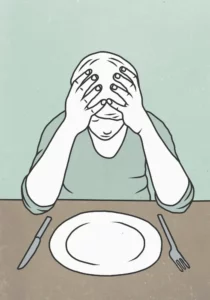
Eating disorders are defined as “serious mental illnesses that involve abnormal eating habits.” There are three main types of eating disorders:
- Anorexia nervosa: People with anorexia nervosa have a distorted view of their body weight and see themselves as overweight even when they are dangerously underweight.
- Bulimia nervosa: People with anorexia nervosa have a distorted view of their body weight and see themselves as overweight even when they are dangerously underweight.
- Binge eating disorder: Binge eating disorder is characterized by periods of uncontrolled overeating, but unlike bulimia, there is no purging behavior afterward.
While all these are different types of eating disorders, they all have a distorted sense of body image and a preoccupation with food and weight. These can prove to be extremely harmful to a person’s physical and mental health.
11 Most Common Eating Disorder Behaviors
Eating disorders are complex illnesses with a wide range of symptoms. Here are 11 eating disorder behaviors that you or someone you know may be struggling with an eating disorder.
Skipping meals or eating very small portions
People with eating disorders often try to limit their food intake by skipping meals or only eating very small portions. They may also become frequent at making excuses not to eat (e.g. “I’m not hungry,” or “I already ate”). This may be a sign that they are trying to restrict their food intake. Additionally, eating disorders can cause people to feel ashamed of their behavior, so they may try to hide it by eating in secret.
Eating only certain “safe” foods and avoiding others
People with eating disorders often become fixated on certain “safe” foods that they feel they can eat without gaining weight. They may also avoid eating certain foods or food groups because they fear these will make them gain weight. For example, someone with anorexia may only eat a very limited selection of fruits and vegetables, while someone with bulimia may avoid eating carbohydrates. . They may become obsessed with calorie counting, fat grams, and dieting. They may also spend a lot of time thinking about how to avoid gaining weight or how to lose weight.
Excessive exercise

People with eating disorders often engage in excessive or compulsive exercise. This may be an attempt to burn off calories consumed or to prevent weight gain. Exercise may also become a way of punishing oneself for eating. For example, someone with anorexia may feel the need to run for hours after eating a small meal, while someone with bulimia may punish themselves by working out after bingeing.
While exercise is obviously a positive behavior for overall fitness and health, when it becomes excessive or is done for the wrong reasons, it can be harmful. It can be even more harmful when an individual doesn’t maintain adequate nutrition to support their activity level.
Extreme weight loss or gain

This is the most obvious and tell-all sign of an eating disorder. A person may lose a significant amount of weight in a short period of time, or they may gain weight rapidly. This may be due to the fact that they are not consuming enough calories, or they may be overeating and then purging.
While this sudden fluctuation becomes evident, people may engage in other tactics in an attempt to hide their weight loss or gain. For example, someone who is anorexic may wear baggy clothes to disguise their weight loss, while someone with bulimia may frequently use the bathroom after meals to purge.
Purging through vomiting or using laxatives
This behavior is more common in bulimia, but it can also be seen in anorexia and other eating disorders. Purging is done as a way of getting rid of calories that have been consumed. It is done through vomiting or by taking laxatives. This can obviously be harmful to the body, and it can lead to electrolyte imbalances, dehydration, and other health problems.
In addition to intentional purging, some other ways people with eating disorders may try to get rid of calories are by excessive exercise, or by skipping meals. They may also fast for long periods of time.
Dieting behavior
It is no secret that dieting is extremely common, especially in Western cultures. However, dieting can become problematic when it becomes excessive or obsessive. People with eating disorders view dieting as a way to lose weight, and they often become fixated on certain foods or food groups. For example, someone with anorexia may only eat a very limited selection of fruits and vegetables, while someone with bulimia may avoid eating carbohydrates.
Dieting behavior can also be harmful when it leads to nutritional deficiencies. For example, someone who is anorexic may not consume enough calories to support their activity level, which can lead to health problems.
Changes in mood and behavior
People with eating disorders often experience changes in mood or behavior. This may include irritability, anxiety, depression, or fatigue. These changes can be a result of the physical effects of the eating disorder, or they may be due to the psychological effects. For example, someone with anorexia may become depressed due to the lack of nutrients their body is getting, while someone with bulimia may be anxious about being caught purging.
Fixation on food and cooking shows

A person with an eating disorder may become fixated on food and cooking shows. This may be due to the fact that they are interested in food, or it may be because they are trying to learn new ways to cook so that they can lose weight. For example, someone with anorexia may watch cooking shows to find new low-calorie recipes, while someone with bulimia may watch them to find new ways to hide their purging behavior.
They may also do so in order to compensate for the fact that they are not eating. For example, someone with anorexia may watch cooking shows as a way to vicariously experience the pleasure of eating without actually consuming any calories.
Constantly checking in the mirror for flaws
People with eating disorders often become fixated on their appearance and they may spend a lot of time looking in the mirror. They may be looking for flaws or imperfections that they can then try to fix with dieting or other behaviors. This can obviously lead to a preoccupation with appearance and body image, which can worsen the eating disorder.
Excessive of this behavior can lead to severe consequences, such as social isolation, emotional instability, low self-esteem, and even suicidal thoughts or attempts. It may also lead to one developing body dysmorphia, which is a condition where someone becomes obsessed with a perceived flaw in their appearance. This is a serious mental disorder that can have devastating effects on a person’s life.
Withdrawing from friends and activities
Due to the changes in mood and behavior that come with eating disorders, people may start to withdraw from friends and activities they once enjoyed. This is because they may be feeling too exhausted or depressed to participate, or they may be worried about being around food. This can obviously lead to social isolation, which can worsen the effects of the eating disorder. Some common ways in which this behavior is evident in daily life includes instances such as:
- Missing out on meals with friends or family
- Stopping participating in activities that were once enjoyed
- Skipping school or work
- Snapping out at friends or loved ones
- Eating in secret
- Avoiding social gatherings
An unhealthy preoccupation with body weight and shape
People with eating disorders often become fixated on their weight and shape. This can obviously lead to a preoccupation with appearance and body image, which can worsen the eating disorder. Some common ways in which this behavior is evident in daily life include instances such as:
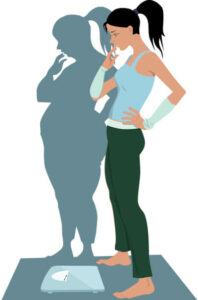
- Weighing oneself multiple times per day
- Obsessing over the number on the scale
- Constantly comparing one’s self to others
- Googling ways to lose weight
- Checking in the mirror for flaws
- Wearing baggy clothes to hide their body shape
If left unmonitored, these instances can turn extremely gruesome and disturbing. Some examples include:
- Verbally expressing a desire to be thinner
- Wishing to be dead
- Starving oneself
- Bingeing and then purging
- Excessive exercise
- Abusing diet pills or laxatives
- Self-harm
Above are some of the most common and worrying eating disorder behaviors one should look out for. If you or someone you know is exhibiting any of these signs, it is important to seek professional help as soon as possible. Eating disorders are serious mental illnesses that can have devastating effects on a person’s life. They often require treatment in order to be effectively managed.
Tips To Deal
Now that we know some of the warning signs of eating disorder behaviors, what can we do if we see them?
If you’re worried that the person may be in danger of harming themselves, it’s important to seek professional help immediately. This is especially true if they are displaying any warning signs of suicide or self-harm. Eating disorders are serious mental illnesses that often require treatment in order to be effectively managed, so it’s important to seek professional help if you’re worried that someone you know may be suffering from one.
Professional Help
If you you or someone you know is exhibiting eating disorder behaviors, there are a few things you can do. Firstly, you can talk to your healthcare provider about your concerns. They will be able to assess the situation and refer you to a specialist if necessary. Some of the most recommended types of professional interventions include:
- Therapy: Therapy is the process of talking to a trained professional about your thoughts, feelings, and experiences in order to gain insight and understanding. It can be an extremely effective treatment for eating disorders. It can help people to understand the root cause of their disorder and develop healthy coping mechanisms. Some of the most common types of therapies include:
-Cognitive-behavioral therapy (CBT)
-Interpersonal psychotherapy (IPT)
-Family-based treatment (FBT)
- Medical intervention: In some cases, medical intervention may be necessary in order to effectively manage an eating disorder. This can involve things like monitoring vital signs and providing nutritional support. Nutritional counseling is also often recommended in order to help people with eating disorders develop healthy eating habits. It involves strategies such as:
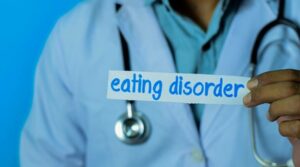 -Identifying and addressing negative thoughts and emotions around food
-Identifying and addressing negative thoughts and emotions around food
-Learning how to eat in a balanced and nutritious way
-Making peace with food
- Hospitalization: In severe cases, hospitalization may be necessary. This happens in order to stabilize a person’s condition and keep them safe from harm. This usually involves providing around-the-clock care and supervision, as well as access to medical treatment and psychological support.
Eating disorder behaviors can have devastating effects on a person’s life. If you think that you or someone you know may be suffering from one, it’s important to seek professional help as soon as possible. With early intervention and treatment, most people can learn to manage their illness and live happy and fulfilling lives.
Self Help
If professional treatment is something that you don’t prefer, there are a few things you can do to help yourself.
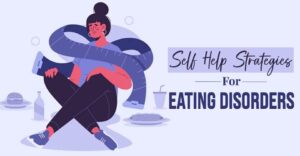
- Challenge negative thoughts: If you’re struggling with negative thoughts and emotions around food, it can be helpful to challenge them. This means recognizing when you’re having these thoughts and then consciously choosing to question or reframe them. For example, if you’re thinking “I’m so fat,” you could try thinking “I am worthy of love and respect regardless of my size.”
- Practice self-compassion: Eating disorders often involve a lot of self-criticism and shame. Practicing self-compassion can be a helpful way to counterbalance these negative emotions. This means treating yourself with the same kindness, understanding, and forgiveness that you would extend to others.
- Educate yourself: Learning about eating disorders can be a helpful first step in understanding and managing your illness. There are a lot of myths and misconceptions out there, so it’s important to get accurate information from reliable sources.
- Join a support group: Connecting with others who are going through similar experiences can be incredibly helpful. It can provide you with a sense of community and belonging, as well as a chance to share your experiences and learn from others.
- Find an activity you love: Doing things that make you happy and help you to relax can be a great way to cope with the stresses of life. It can also give you something to look forward to and help you to stay motivated.
- Build healthy coping mechanisms: Developing healthy coping mechanisms is an important part of managing any mental illness. This means finding ways to deal with difficult emotions and situations in a constructive way. Some examples of healthy coping mechanisms include journaling, exercise, and spending time outdoors.
- Make lifestyle changes: Making changes to your diet and exercise routine can be a helpful way to take control of your eating disorder. However, it’s important to make sure that these changes are based on your own needs and preferences, not on what you think you should be doing.
Eating disorders are complex illnesses with a wide range of causes. There is no one-size-fits-all approach to treatment. Therefore it’s important to work with a professional who can tailor a plan that meets your unique needs. If you’re struggling with an eating disorder, know that there is help available and you are not alone.
Conclusion
Eating disorder behaviors are serious activities that can have a profound impact on a person’s life. If you think you may be suffering from one, it’s important to seek professional help or take steps to help yourself. With treatment and support, most people can learn to manage their illness and live happy and fulfilling lives.
If you are searching for a reliable, safe, and affordable treatment center for eating disorder behaviors, please contact Mantra Care. We offer a variety of treatment options that are customized to meet the needs of each individual. Our team ensures maximum confidentiality and effectiveness for your comfort. You may visit our website or give us a call to book an online therapy session or download our free Android or iOS app for more information!
